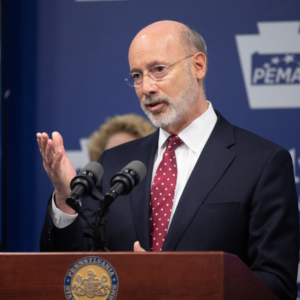The Environmental Quality Board (EQB) may have voted overwhelmingly to push Pennsylvania into the Regional Greenhouse Gas Initiative (RGGI), but Republicans in the legislature say the fight over entering the cap-and-trade program is far from over.
“The governor unilaterally entering RGGI without any legislative approval is a direct insult to democracy,” says state Rep. Ryan Warner (R-Fayette).
The EQB voted 15-4 last week to adopt the final regulation that would bring the state into a regional agreement among Connecticut, Delaware, Maine, Maryland, New Hampshire, New Jersey, New York, Rhode Island, Vermont, and Virginia. It sets a cap on total carbon dioxide emissions from electric power generation in those states. Generators will purchase credits – effectively a carbon tax – per ton of emissions through auctions.
RGGI would help address the global climate crisis, “one of the most important and critical challenges we face,” Gov. Tom Wolf (D) said last month.
“Even as we continue work to mitigate the spread of COVID-19, we cannot neglect our responsibility and our efforts to combat climate change.”
“This is nonsense,” says House Environmental Resources and Energy Committee Chair Daryl Metcalfe (R-Butler). “India, Turkey, China, Vietnam, they’re all going gangbusters to build coal-fired power plants, and what’s being proposed here is just going to hurt Pennsylvanians, hurt Americans, for very negligible impacts and any CO2 issues that might actually be an issue.”
Wolf used his executive power in 2019 to instruct Pennsylvania’s Department of Environmental Protection (DEP) to join RGGI by January 1, 2022. The Independent Regulatory Review Commission called for a delay until January 1, 2023, but the EQB pushed ahead with its vote.
“EQB has typically been perceived as a rubber stamp for the administration because of his secretaries that sit on the board and other individuals that are more at the discretion of the administration with few exceptions, but you are all responsible individuals here today,” said Metcalfe. “Believe me, there are people across the state that are going to care if their livelihoods are destroyed and their economies have to deal with the havoc that will be created by this.”
“We would be the only state to enter RGGI without legislative approval,” says Warner. “The other states have done it through the legislative process, so, I’m not sure exactly what the governor is thinking in this regard.”
Six Senate Democrats joined Republicans in passing a veto-proof bill to stop Wolf from putting Pennsylvania in RGGI. Sen. John Kane (D-Chester, Delaware) was one of them.
“We need to transition towards an increased reliance on clean and renewable energy — I think we all know that — and I’ve supported legislation to do that,” Kane told Delaware Valley Journal. “But I want to make sure there’s a plan in place to support our working people and our working families before we make that transition.”
Sen. Gene Yaw (R-Bradford, Lycoming, Sullivan, Susquehanna, Union) points out Pennsylvania has already lowered its emissions to a greater extent than what RGGI states have done.
“Under RGGI, we are transferring part of our economy and part of our environmental protections to nine or 10 other states,” said Yaw. “We can do things better on our own and I have more faith in Pennsylvanians doing things the right way and protecting the environment than what other states say we should do.”
Senate Bill 119 is now in the House where Leo Knepper, political director for Citizens Alliance of Pennsylvania (CAP), thinks some House Democrats may join Republicans to vote for the measure.
“There were Democrats that voted on a previous iteration of it in the last legislative session,” Knepper noted. “Organized labor has actually made a concerted effort to get more Democrats to vote in favor of it, so, they should be able to garner a veto-proof majority in the House as well.”
Organized labor is concerned about RGGI’s impacts on businesses and what it means for jobs.
“We’re encouraging people to require legislative approval before getting into a carbon tax,” said Knepper. “What’s sad or disappointing is that they are certainly not moving quickly, and I understand they want to have a summer vacation, but the governor’s actions will destroy Pennsylvania’s economy, or at least cripple it, so, this is something that they have the ability to take action on very quickly, whether or not they are going to take that action is questionable.”
“The Environmental Resources & Energy Committee in the House will be voting on trying to do different maneuvers here to block this,” says Representative Warner. “We will be meeting September 2 to try to delay, and there’s going to be pushback all around because this country was literally founded on the principle that one executive does not have the authority to tax us without our approval, and that is exactly what this is: a tax without the approval of the legislature.”

